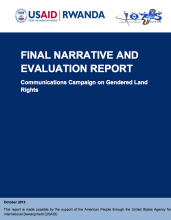Land Library Search
Through our robust search engine, you can search for any item of the over 73,000 highly curated resources in the Land Library.
If you would like to find an overview of what is possible, feel free to peruse the Search Guide.
/ library resources
Showing items 1 through 9 of 49.Between October 2014 and October 2015, Radio Ishingiro with the support of USAID
Land Project implemented a Communications Campaign focused on influencing the
attitudes and mindsets of men and boys about gender-equal land rights to overcome
This research, entitled "The Impact of Gendered Legal Rights to Land on the Prevalence and Nature of Intra- and Inter-Household Disputes" set out to interrogate the changing landscape of gendered land rights in Rwanda, and to examine the impact of the statutory changes introduced by laws governin
Before 1999, land rights in Rwanda were governed by three regimes: customary
(traditional) law, colonial laws still in effect, and laws enacted after independence. In each of
these, men were privileged in ownership and control of land whereas women were excluded
In Africa, land has an emotional and mystical value beyond the economic consideration and
represents the social security and the continuity and independence of a family. In much of rural
Africa, land constitutes the primary source from which millions of people derive their daily
Land tenure security is crucial for women's empowerment and a prerequisite for building secure and resilient communities. Tenure is affected by many and often contradictory sets of rules, laws, customs, traditions, and perceptions.
To say that access to land is one of the most important conditions for the
empowerment of African women, would be an understatement. The cultivation of land is one
of the main sources of income and economic wealth depends strongly on a well-elaborated
This report cautions against an overly rigid approach to the Sustainable Development Goals (SDGs), which it argues could limit development options for poor countries, particularly in how they are able to manage critical water resources.
Improving women’s ability to securely access land is recognised as an effective means to increase gender equality and advance other key social and economic development goals.
As Parliamentary gender quotas have become increasingly popular, so too
has the debate surrounding their effectiveness in enhancing women’s
representation and gender equality in governments around the world. Women offer







